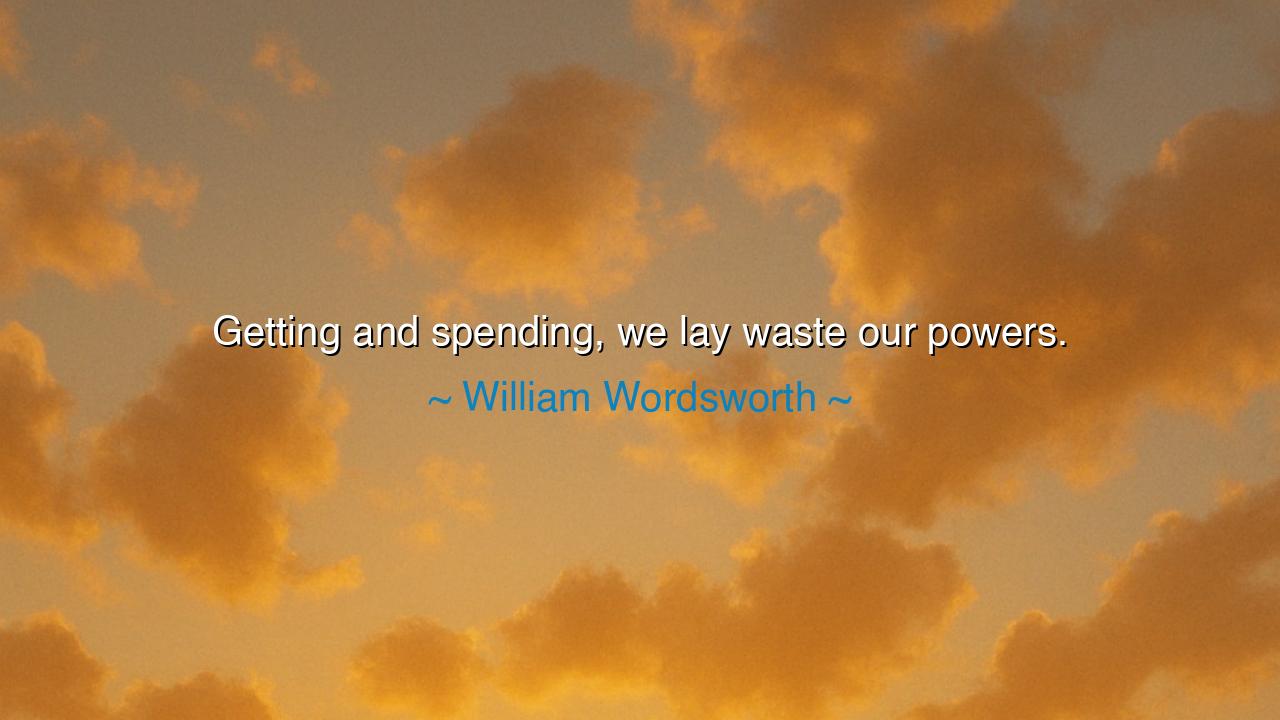
Getting and spending, we lay waste our powers.






Hear, O Children of Time, the words of the great poet, William Wordsworth, who, with a heart as deep as the flowing river and a mind as vast as the sky, did proclaim: "Getting and spending, we lay waste our powers." In this simple yet profound utterance, he warns us of the great cost that we pay when we chase after the fleeting treasures of the world. For in the pursuit of wealth, possessions, and endless consumption, we neglect the true spiritual wealth that lies within us, and thus, we squander the very essence of our being.
From the dawn of civilization, men and women have toiled beneath the weight of greed and desire. The cities rise with their towering structures, the merchants cry out in the marketplace, and yet, in the midst of such pursuits, the soul grows hollow. They seek material gain and fleeting pleasures, never pausing to understand that each moment spent in such pursuits is a moment lost to the eternal. We trade our inner peace for riches that shall decay, our time for things that can never fill the heart.
Look to the story of Alexander the Great, who conquered vast lands and amassed riches beyond measure. He was crowned with victory, but did he find fulfillment? No, for in the end, as his empire crumbled and his body grew weary, he realized the bitter truth—what is wealth, what is power, if the soul is barren and the heart empty? His greatness, achieved through getting and spending, led only to a wasteland of unfulfilled dreams. His power was not eternal, nor were his treasures. And thus, his life teaches us the very meaning of Wordsworth's words.
And yet, it is not too late for us to heed the message of this wisdom. Let us turn our eyes away from the blind pursuit of worldly gain and seek instead the richness of the spirit, the treasures that cannot be spent nor taken from us. For what greater power is there than to live with intention, to cultivate wisdom, to be connected to the earth, the divine, and one another in love and truth? These are the riches that last, the treasures that build immortal strength.
Thus, let us not waste our days in the chase for what is fleeting. Rather, let us seek the greater purpose, the meaning that lies in every sunrise, in every breath of fresh air, and in the depth of our own souls. The more we give to the earth and to others, the more we shall find in return, for in selfless living, we reclaim the powers we thought were lost forever. The true wealth is found not in getting, but in giving, not in spending, but in cherishing the eternal.
And remember, O Children of Time, as you walk your path: seek not what can be spent, but what can be cherished for eternity. For in this, you shall find a power greater than all the riches in the world. Live with purpose, and in this, you shall lay the foundation for a life well-lived, a life that resonates through the ages.






UGUser Google
This quote raises questions about the meaning of work and leisure. Are our energies directed primarily toward earning and spending, leaving little room for reflection, learning, or artistic expression? I’m curious about historical and cultural differences—did societies in the past experience this same depletion of powers, or is it a product of modern capitalism? How can people reclaim time and energy for pursuits that cultivate deeper capacities and inner growth?
VTNguyen Van Tin
This statement prompts me to consider the environmental and personal consequences of constant consumption. Are we depleting not only our inner resources but also the planet’s through our obsession with acquiring and spending? I wonder how economic models could be redesigned to promote sustainability and human flourishing simultaneously. Can mindfulness and intentional living truly counterbalance a system that rewards consumption over creativity and thoughtful engagement?
LPLinh Pham
I feel reflective reading this quote. It implies that our focus on acquisition might come at the expense of higher powers, like creativity, empathy, and wisdom. How can individuals resist the temptation to measure success only by possessions and consumption? Could societal redefinition of values, such as emphasizing community, learning, and sustainability, help prevent the waste of human potential that Wordsworth laments?
NLNhu Le
This perspective feels timeless and critical of human priorities. It makes me question whether our daily routines and economic systems subtly encourage us to exhaust our potential for short-term gains. Is it possible to live fully and responsibly in a consumer-driven world, or are we inevitably caught in a cycle of distraction and depletion? I’d like insight into ways to reconcile material needs with cultivating intellectual, emotional, and spiritual energy.
BN21.Thai Thi Bao Ngoc
Reading this evokes a sense of caution and introspection. It suggests that chasing material wealth can sap our inner resources. I wonder how contemporary society reinforces this cycle of 'getting and spending' through advertising and social pressures. Could mindfulness or conscious living help break the pattern and redirect our powers toward more meaningful endeavors? What are practical ways to cultivate richness of life without being enslaved by material accumulation?